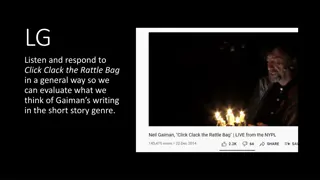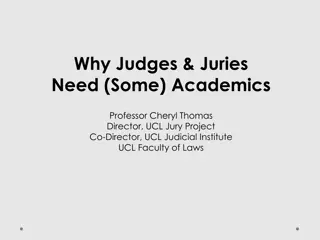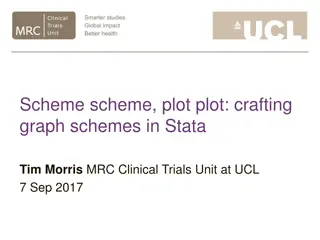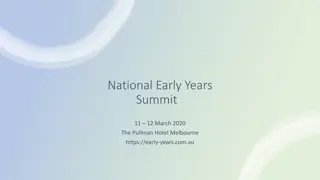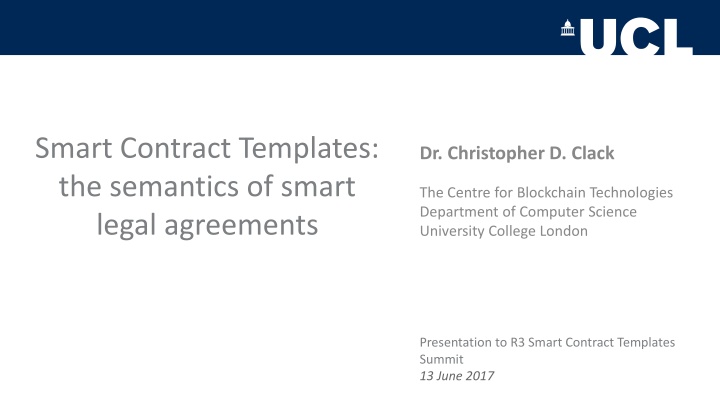
Smart Contract Templates: Semantics, Validation, and Analysis
Explore the world of smart legal agreements through semantic analysis, validation of contract code, and types of semantic analysis such as temporal, deontic, and operational. Learn about separability and interaction of different semantics for effective smart contracts.
Download Presentation

Please find below an Image/Link to download the presentation.
The content on the website is provided AS IS for your information and personal use only. It may not be sold, licensed, or shared on other websites without obtaining consent from the author. If you encounter any issues during the download, it is possible that the publisher has removed the file from their server.
You are allowed to download the files provided on this website for personal or commercial use, subject to the condition that they are used lawfully. All files are the property of their respective owners.
The content on the website is provided AS IS for your information and personal use only. It may not be sold, licensed, or shared on other websites without obtaining consent from the author.
E N D
Presentation Transcript
Smart Contract Templates: the semantics of smart legal agreements Dr. Christopher D. Clack The Centre for Blockchain Technologies Department of Computer Science University College London Presentation to R3 Smart Contract Templates Summit 13 June 2017
Contents Code Validation and Semantic Analysis Types of Semantic Analysis Separability and Interaction Can Smart Contract Code have Non-Operational Semantics? Semantic Issues Research Directions and Discussion Points
Validating Smart Contract Code Smart Contract Code is an encoding of part of the Smart Legal Agreement Smart Legal Agreement We need to be certain that the smart contract code is behaving in accordance with the agreement encode The smart contract code requires: Smart Contract Code testing (it operates without error) and validation (it correctly performs the contract)
Semantic analysis Semantic analysis of the legal text can be used: Semantic analysis To generate a set of validation scenarios Improving quality of validation Smart Legal Agreement To clarify the runtime information needed by the code Improving quality of code encode Smart Contract Code Validation To help simplify obscure code Exposing possible bugs recode To make possible the encoding of more aspects of the agreement
Types of Semantic Analysis Temporal semantics The time aspects of the agreement past, present, future, fixed, floating, conditional Deonticsemantics The rights and obligations of the parties Operational semantics The required actions some of which may not be encodable, or we may not wish to encode
Separability and Interaction Key: Temporal Deontic Operational Are the temporal, deontic and operational semantics separable? Temporal often linked to operational: upon reasonable demand Operational, temporal and deontic are often linked: a single or partial exercise of any right, power or privilege will not be presumed to preclude any subsequent or further exercise, of that right NB if this were automated in the smart contract code, three validation scenarios might be (i) that the code should only exercise such a right appropriately (e.g. once per occasion), and (ii) the code is able to exercise that right on each occasion, even if previously exercised, and (iii) the code must be able to identify separate occasions . ISDA 2002 Master Agreement, Sections 4(a)(iii) and 9(f), reproduced with the permission of International Swaps and Derivatives Association, Inc.
Separability and Interaction Key: Temporal Deontic Operational Many clauses have a complex mix of deontic, operational and temporal aspects Liability. If:- (1) X is required by any applicable law, as modified by the practice of any relevant governmental revenue authority, to make any deduction or withholding in respect of which X would not be required to pay an additional amount to Y under Section 2(d)(i)(4); (2) X does not so deduct or withhold; and (3) a liability resulting from such Tax is assessed directly against X. then, except to the extent Y hassatisfied or thensatisfies the liability resulting from such Tax, Y will promptlypay to X the amount of such liability (including any related liability for interest, but including any related liability for penalties only if Y hasfailed to comply with or perform any agreement contained in Section 4(a)(i), 4(a)(iii) or 4(d)). ISDA 2002 Master Agreement, Section 2(d)(ii), reproduced with the permission of International Swaps and Derivatives Association, Inc.
Can Smart Contract Code have Non-Operational Semantics? Yes! In a contract ALL actions derive from an obligation or right of some form (a deontic aspect) Many actions have embedded temporal aspects (trivially) and may have embedded deontic aspects E.g. if the code checks all expected payments and detects failure, it is obliged to send notice of failure to the other party, and check again in one Local Business Day (ISDA 2002 Master Agreement Section 5(a)(i)) Discretion is a right (a deontic aspect) some actions may be discretionary Detecting a breach of an obligation is an action (to detect) linked to a deontic aspect
Can smart contract code have non-operational semantics? Key: Temporal Deontic Operational Smart contract code may need to encode the dynamic replacement of obligations For example, if netting were supported on the distributed ledger: Netting of Payments. If on any date amounts would otherwise be payable:- (i) in the same currency; and (ii) in respect of the same Transaction, by each party to the other, then, on such date, each party s obligation to make payment of any such amount will be automatically satisfied and discharged and, if the aggregate amount that would otherwise have been payable by one party exceeds the aggregate amount that would otherwise have been payable by the other party, replacedby an obligation upon the party by which the larger aggregate amount would have been payable to pay to the other party the excess of the large aggregate amount over the smaller aggregate amount. ISDA 2002 Master Agreement, Section 2(c), reproduced with the permission of International Swaps and Derivatives Association, Inc.
Semantic Issues Issues with the semantics of words Culture clash between law and computer science: e.g. execution , performance , termination Language imprecision: reasonable (to whom? In what context?) soon , promptly , timely (Weeks? Days? Hours? Minutes? Seconds?) or (including or excluding both being true?) if deemed (by whom? when?) The semantics of complex modal verbs can be difficult to express in formal logic E.g. If:- (A) a party does not pay any amount that, but for Section 2(a)(iii), would have been payable, it will, to the extent permitted by applicable law and subject to Section 6(c) and clauses (B) and (C) below, pay interest
Semantic Issues Issues arising from temporal semantics Terms relating to unknown times of possible future events (e.g. do X upon demand ) Terms relating to conditional past or conditional future or both, and complex drafting (e.g. use of modal verbs): Interest on Deferred Payments. If:- (A) a party does not pay any amount that, but for Section 2(a)(iii), would have been payable, it will, to the extent permitted by applicable law and subject to Section 6(c) and clauses (B) and (C) below, pay interest (before as well as after judgement) on that amount to the other party on demand (after such amount becomes payable) in the same currency as that amount, for the period from (and including) the date the amount would, but for Section 2(a)(iii), have been payable to (but excluding) the date the amount actually becomes payable, ISDA 2002 Master Agreement, Sections 9(h)(i)(3), reproduced with the permission of International Swaps and Derivatives Association, Inc.
Pragmatics Pragmatics (a term used in Linguistics): Semantics: what the words mean Pragmatics: what the writer means, and what the reader thinks the writer means Shared context, and understood implications and pre-suppositions The role of law (e.g. implied terms) The normative rationale : is a contract a set of moral promises or a set of legal promises? Do courts interpret intent or words? (c.f. Ethereum and The DAO)
Draft research plan + Shared Context? ISDA Master Agreement Pragmatic analysis Semantic analysis Operational Clear, Unambiguous, Formal Description of the Meaning of the ISDA Master Agreement Temporal Deontic
Discussion Points and Next Steps Have these issues already been addressed elsewhere? What are the practical constraints for further developing these ideas? Any preferences for research directions and next steps? For example, are academic publications useful to this community?

